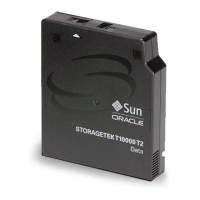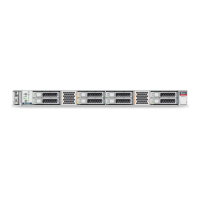Periodic
The system sends a notication as scheduled in Oracle FS System Manager (GUI)
conguration.
After the ASR feature is activated, MOS expects to receive an event, known as a
heartbeat, each day from the Oracle FS System. The daily heartbeat keeps the ASR
feature in an active state. The following options ensure that MOS receives daily and
weekly heartbeat event notications:
• Standard periodic Call‑Home
• Larger periodic Call‑Home
For both options, do not change the option schedules.
If the daily heartbeats are not received, MOS creates an SR indicating that the
periodic heartbeat is overdue. MOS then dispatches the SR to Oracle Customer
Support for resolution.
The Oracle FS System maintains a directory of log collections, each of which
represents an event or a manual log bundle. You can select a log bundle le, a
range of log bundle les, or a group of log bundle les to download or transmit
to MOS. The name of each log bundle indicates the reason, date, and time (GMT)
that the bundle was created, as well as the reason, date, and time the previous
bundle was created.
Oracle Customer Support might request that you send multiple log bundles to
MOS. When you create a manual log bundle, you can add an SR number in the
Notes eld. MOS then automatically associates that log bundle with your active
SR.
You can send the log bundles to a local server, if necessary. However, sending log
bundles to the local server disables all ASR functionality.
Related Links
Auto Service Requests
Congure Call-Home for ASR
Create a Log Bundle
Configure Call-Home for ASR
Congure the Call‑Home options to ensure that the Oracle FS System sends
specic event notications to My Oracle Support (MOS). MOS then receives
these notications and, if necessary, initiates a service request (SR).
Prerequisites
• If the Oracle FS System is congured for Call‑Home options and Auto
Service Request (ASR), and the connection to the Call‑Home server is direct,
without a proxy, then all rewalls must allow all three Pilot IP addresses to
make outbound connections on TCP Port 443 to the Call‑Home server at
Oracle.
Configure Global Settings
174

